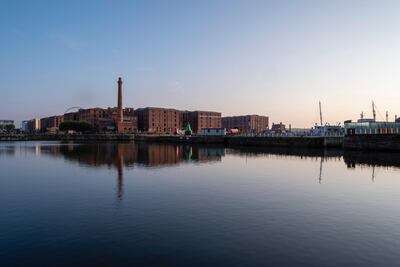Unesco released a draft report on Monday with a range of recommendations ahead of the UN cultural agency's 44th annual conference next month.
A few plans have sparked controversy, including one to list the Great Barrier Reef as "in danger" over deterioration caused by climate change, a move that Australian Environment Minister Sussan Ley has said the country would challenge.
In the UK, Unesco has recommended the Liverpool Waterfront be removed from the list of World Heritage Sites after advice over the development of the city went ignored.
In particular, the organisation said building at the waterfront and the northern dock area “have progressively eroded the integrity” of the historic port, which was granted World Heritage status in 2004.

The committee wrote in its report it “regrets that the process for the implementation of the Liverpool Waters project and other large-scale infrastructure projects in the waterfront and northern dock area of the property and its buffer zone has resulted in serious deterioration and irreversible loss of attributes”.
A government representative said it was "disappointed" in the plan.
Steve Rotheram, metro mayor for the region, said Liverpool “should not be faced with the binary choice between maintaining heritage status or regenerating left behind communities”.
Another proposal is to put Venice on the agency's endangered list if it does not permanently ban cruise ships from docking in the floating city. The issue, which will be discussed at Unesco's session, could warrant urgent action by the Italian government if given the go-ahead.
“A long-term solution is urgently needed,’’ Unesco said.
A number of recommendations relate to sites in the Mena region, too. Iraq's ancient city of Ashur (Qal'at Sherqat), for example, will be up for discussion, as the agency reiterates its request for a full damage assessment of the property and works to have it removed from the list of World Heritage in Danger, which it's been on since 2003.
Unesco also cites reactivated plans to construct the Makhool dam, which it describes as "regrettable".
"When the property was first inscribed on the World Heritage List, the large dam project was considered a major threat justifying concurrent inscription of the site on the List of World Heritage in Danger," the report states.
"Considering the foreseen impact that the dam would have on the property and numerous other archaeological sites, it is recommended that the committee again request the cancellation or relocation of the project."

A draft decision recommends retaining the ancient city of Aleppo in Syria on the List of World Heritage in Danger, on which it's been since 2013, and requests an updated report in time for Unesco's 2022 session on the state of conservation and implementation of previously state recovery framework, which encompasses a range of properties, including souqs, the Great Mosque and citadel.
"Planning, co-ordination and regulation setting, as well as restoration works, have progressed well," Unesco said in its analysis and conclusions on the old city.
"It is recommended that the Committee welcome that the Directorate General of Antiquities and Museums, its partners and the local community carried out work despite the extremely difficult conditions, and encourage pursuit of activities planned."
Similar recommendations have been made for sites in Yemen and locations in Palestine will also be up for discussion.
Unesco's next session will take place from Friday, July 16 to Saturday, July 31.

